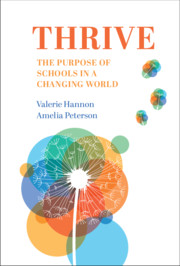Book contents
- Thrive
- Thrive
- Copyright page
- Dedication
- Contents
- Figures
- Preface
- Acknowledgements
- Authors
- 1 The Need for Purpose
- 2 New Answers to ‘Why’
- 3 The Context for a New Purpose
- 4 What Does It Mean to ‘Thrive’ – Globally?
- 5 Pathfinders for a Thriving Planet
- 6 Stronger Together
- 7 Pathfinders for Thriving Societies
- 8 The Interpersonal Purpose
- 9 Pathfinders for Thriving Relationships
- 10 Me, Myself and I
- 11 Pathfinders for the Thriving Self
- 12 Agency
- 13 From Schools to Learning Ecosystems
- 14 Beyond Beautiful Exceptions
- 15 Getting Purposeful
- Bibliography
- Index
1 - The Need for Purpose
Why We Have to Ask ‘Why?’
Published online by Cambridge University Press: 21 January 2021
- Thrive
- Thrive
- Copyright page
- Dedication
- Contents
- Figures
- Preface
- Acknowledgements
- Authors
- 1 The Need for Purpose
- 2 New Answers to ‘Why’
- 3 The Context for a New Purpose
- 4 What Does It Mean to ‘Thrive’ – Globally?
- 5 Pathfinders for a Thriving Planet
- 6 Stronger Together
- 7 Pathfinders for Thriving Societies
- 8 The Interpersonal Purpose
- 9 Pathfinders for Thriving Relationships
- 10 Me, Myself and I
- 11 Pathfinders for the Thriving Self
- 12 Agency
- 13 From Schools to Learning Ecosystems
- 14 Beyond Beautiful Exceptions
- 15 Getting Purposeful
- Bibliography
- Index
Summary
All the decisions we make in school – what gets taught (curriculum design), how we teach (pedagogy) and what learning we recognise and reward (assessment and certification) – should be based in beliefs about the purpose of learning. But there is currently no agreed coherent answer to the question 'What is learning at school for?' The implicit answer is built on economics: that the purpose of education is to provide 'growth' as measured by GDP. But growth, and particularly the narrower concept of GDP, are insufficient and increasingly attacked by economists themselves. We cannot continue to simply 'supply' skills and expect the economy to use them to create productive, equal societies. The challenges of inequality, resource exploitation and ill-health are not being solved in this way. A broader narrative must encompass more of what we know about what makes for healthy lives, societies and ecosystems.
- Type
- Chapter
- Information
- ThriveThe Purpose of Schools in a Changing World, pp. 1 - 14Publisher: Cambridge University PressPrint publication year: 2021

